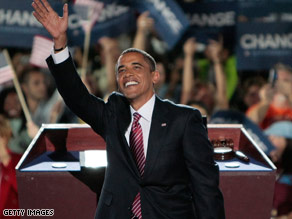At this point, I realize I'm belaboring the point. "Sarah Palin is an awful choice for a running mate," I can hear you saying, "We get it."
But I can't help but think the magnitude of this mistake has not yet sunk in among political observers. I was talking to a friend last night who is a political professional in DC, and the discussion, not surprisingly turned to Palin. He has extensive campaign experience, and every time I argued that this is completely insane, he explained to me a variety of reasons why this John McCain's campaign will benefit, significantly, as a result of this move. I suspect he's probably right.
We were, however, talking about different things. The Palin announcement probably stepped all over Barack Obama's post-convention bounce. Hell, for all I know, this one decision might actually help McCain win the presidency.
But that doesn't change the fact that this is the single most ridiculous development in presidential politics in a generation.
A top "loyal Bushie" told the Politico's Mike Allen that McCain's decision is "disrespectful to the office of the presidency." That's actually a pretty good way of characterizing it.
Campaigns have their ads, their polls, and their tactics, but at the end of the day, credible people who care about the country know that this is more than just a theatrical game -- the future of the nation counts more than the future of a candidate. Those who take affairs of state seriously may take cheap shots, shade the truth now and then, and run the kind of conventional campaigns we've all grown accustomed to, but honorable Americans of character don't gamble with the nation's well-being. They know there are lines that can't be crossed for expediency's sake, no matter how strong the temptation.
McCain was asked a while back about what he'd look for in a running mate. He said the "key" is to find the person "most prepared to take my place" in the event of a crisis. McCain spent the ensuing months with a motto: "Country first."
I don't doubt for a moment that Sarah Palin is a nice person and probably a competent Alaskan governor. But she also has the thinnest background of any candidate for national office since 1908. Is McCain willing, with a straight face, to argue that Palin is the single "most prepared" person in the entire United States to assume the presidency should tragedy strike? Is anyone, anywhere, prepared to argue that McCain has put "country first"? Of course not; these ideas are literally laughable.
Palin's qualifications are, to a very real degree, secondary to the issue at hand. What matters most right now is John McCain's comically dangerous sense of judgment. He picked a running mate he met once for 15 minutes, who's been the governor of a small state for a year and a half, and who is in the midst of an abuse-of-power investigation in which she appears to have lied rather blatantly. She has no obvious expertise in any area, and no record of any kind of federal issues. McCain doesn't care.
Sensible people of sound mind and character simply don't things like this. Leaders don't things like this. It's the height of arrogance. It's manifestly unserious. It's reckless and irresponsible. It mocks the political process. Faced with a major presidential test, McCain thought it wise to tell an imprudent joke of lasting consequence.
Kevin noted:
This is all part of what I was talking about the other day when I noted that McCain is running such a palpably unserious campaign. Steve Schmidt seems solely interested in winning the daily news cycle; his staff spends its time gleefuly churning out juvenile attack videos; McCain himself has retreated into robotic incantations of simpleminded talking points; and now he's chosen a manifestly unqualified VP that he knows nothing about. I've honestly never seen anything like it.
No one has; it's without precedent in modern American politics. The novelty and gimmickry might hold sway with those who base their votes on who they'd like to have a beer with, but that doesn't make it any less of a joke.
Sullivan added, "Palin isn't the issue here. McCain's judgment is. It's completely off the wall. Is there something wrong with him?"
That may sound like a flippant question, but it deserves a serious answer. Is there something wrong with him? Might this be evidence of some kind of impulse problem, as reflected in his shoot-first, think-second approach to foreign policy?
When I think about the respect that John McCain had worked so hard to develop, the stature he'd taken years to cultivate, and the reputation he'd built his career on, it's breathtaking to see him throw it all away. If there's a more complete collapse in modern political times, from hero to clown, I can't think of it.
We're poised to learn a great deal about Sarah Palin, but we've just learned even more about John McCain. He's fundamentally unsuited for the presidency.
 As the nation focuses on Sen. John McCain's choice of running mate, President Bush has quietly moved to expand the reach of presidential power by ensuring that America remains in a state of permanent war.
As the nation focuses on Sen. John McCain's choice of running mate, President Bush has quietly moved to expand the reach of presidential power by ensuring that America remains in a state of permanent war. With the choice of Gov. Sarah Palin (R-AK) as his running mate, Sen. John McCain (R-AZ) is not backing down from oil drilling. Palin is a champion for drilling, the Bush-Cheney approach to energy policy that brought us $4.00-per-gallon gasoline and the rising threat of global warming.
With the choice of Gov. Sarah Palin (R-AK) as his running mate, Sen. John McCain (R-AZ) is not backing down from oil drilling. Palin is a champion for drilling, the Bush-Cheney approach to energy policy that brought us $4.00-per-gallon gasoline and the rising threat of global warming. 




 Today, Time Magazine published an
Today, Time Magazine published an  Yesterday, Sen. John McCain promoted his veterans private health care “
Yesterday, Sen. John McCain promoted his veterans private health care “

 In 2001 and 2003, Sen. John McCain (R-AZ) opposed President Bush’s tax cuts, arguing that he couldn’t “in good conscience support a tax cut in which
In 2001 and 2003, Sen. John McCain (R-AZ) opposed President Bush’s tax cuts, arguing that he couldn’t “in good conscience support a tax cut in which 

